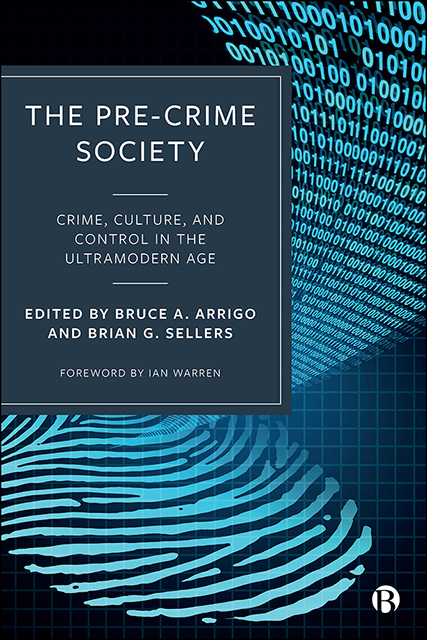Book contents
- Frontmatter
- Dedication
- Contents
- Notes on Contributors
- Foreword
- Introduction: The Ultramodern Age of Criminology, Control Societies and ‘Dividual’ Justice Policy
- Part I Theories, Theorists and Theoretical Perspectives
- Part II Institutions, Organizations and the Surveillance Industrial Complex
- Part III Dataveillance, Governance and Policing Control Societies
- Part IV Systems of Surveillance, Discipline and the New Penology
- Part V Globalizing Surveillance, Human Rights and (In)Security
- Afterword: ‘Pre-Crime’ Technologies and the Myth of Race Neutrality
- Index
7 - Surveillance, Substance Misuse and the Drug Use Industry
Published online by Cambridge University Press: 14 April 2023
- Frontmatter
- Dedication
- Contents
- Notes on Contributors
- Foreword
- Introduction: The Ultramodern Age of Criminology, Control Societies and ‘Dividual’ Justice Policy
- Part I Theories, Theorists and Theoretical Perspectives
- Part II Institutions, Organizations and the Surveillance Industrial Complex
- Part III Dataveillance, Governance and Policing Control Societies
- Part IV Systems of Surveillance, Discipline and the New Penology
- Part V Globalizing Surveillance, Human Rights and (In)Security
- Afterword: ‘Pre-Crime’ Technologies and the Myth of Race Neutrality
- Index
Summary
Introduction
A hermeneutical narrative will be used in this chapter to enable both a critical appreciation of the dynamics of the drug use industry in ultramodern democracies and also solutions to its inherent and real institutional violence. A hermeneutical narrative ‘seeks to bring new resources to our criminological perspective through occupying liminal spaces … and seek(s) to engage with diverse thinkers and traditions who have the potential to offer significant insights to criminology and the practices of justice’ (Pycroft & Bartollas, 2018, p. 234). In particular, an examination of the relationship between the practices of justice and theology will provide a focus of suspicion. This approach will reveal that the ultramodern rationalizations that enshrine the utilitarian calculus and the forms that they take in the technologies of new public management, (e.g. outcome monitoring, drug testing and risk profiling) that pre-criminalize drug users are theological in nature and an ultramodern concealment of sacred scapegoat mechanisms that arise from our anthropological heritage. The rationality of these mechanisms effectively ‘lock in’ the punitive practices that are ontotheological in nature but hidden in plain sight and that justify transcendental violence through the metaphysics argued to be foundational to social order. The hermeneutical narrative, as unconcealment (aleithia) will seek to apprehend the ding an sich (‘the thing in itself ‘) of institutional violence that is locked in to the criminal justice system. With respect to the drug use industry, our critical suspicion is enabled through arguing for recovery as an example of the non-places that have come to define super modernity. In this non-place the drug dependent person is always in transit but can never arrive, precisely because of the conflation of the sacred and economic value (anthropological place) that their suffering and dependence provides to state and society.
Recovery is at the very least concerned with Platonic myths of purity and return and as such is a metaphysical (ontotheological) concept. Aside from the fact that much of the drug misuse industry is underpinned by the explicit theology of 12 Step Programs (particularly in the US), which are a major contribution of Protestant evangelical theology to modernity, criminal justice as practiced in the UK and US is also a theological enterprise. This leads to an antinomy of justifying harsh punishments and rehabilitation with both being grounded in retributive interpretations of the Judeo-Christian scriptures as a basis for atonement (see Gorringe, 1996, 2020).
- Type
- Chapter
- Information
- The Pre-Crime SocietyCrime, Culture and Control in the Ultramodern Age, pp. 155 - 178Publisher: Bristol University PressPrint publication year: 2021

